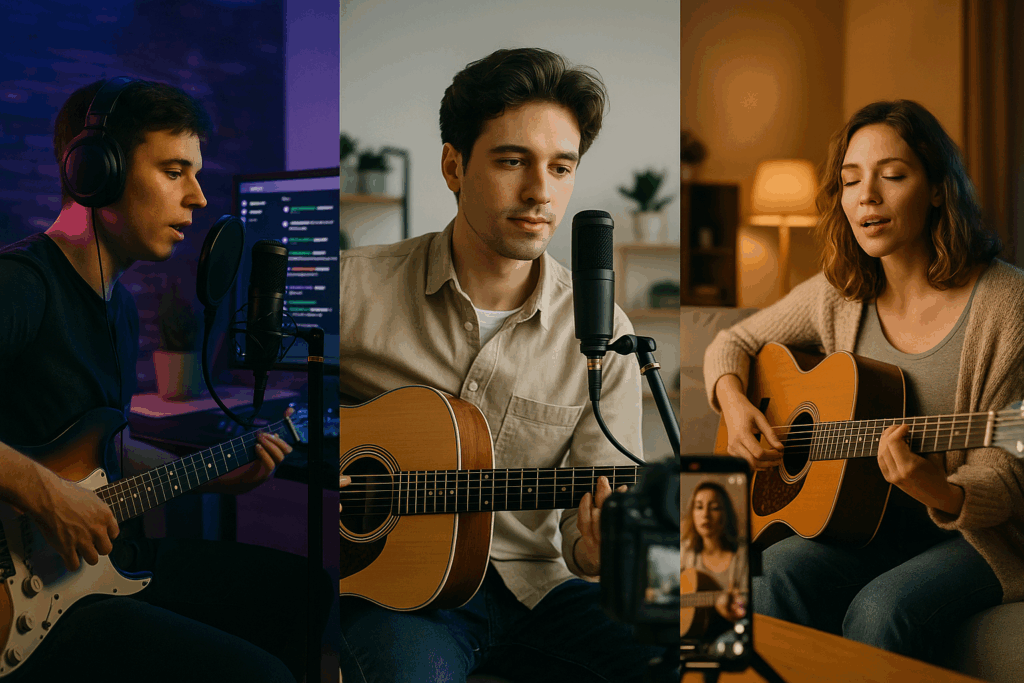If you’re a musician looking to stream your performances, choosing the right platform can make all the difference. In this guide, we compare Twitch vs. YouTube vs. Instagram for live music in 2025, focusing on discoverability, monetization, audio quality, and community features—so you can find the platform that fits your style and goals.
What to Look for in a Live Streaming Platform for Musicians
Before diving into each option, consider what matters most to your success:
- Discoverability: Can new fans find you easily?
- Monetization: Is it easy to earn through tips, subs, or ad revenue?
- Audio Quality: Does the platform deliver clean, reliable sound?
- Fan Interaction: How can you connect with your audience?
- Ease of Use: Is it beginner-friendly?
Twitch for Live Music
Once dominated by gamers, Twitch has evolved into a major platform for musicians and performers.
Key Features
- Categories like “Music” and “Just Chatting”
- Tipping (Bits), Subscriptions, and Donations
- Streamlabs and StreamElements integrations
- Interactive chat with emotes and extensions
Pros
- Built-in monetization from day one (with affiliate status)
- Strong, niche music community
- Long streams with no time limits
Cons
- Discoverability can be tough for new streamers
- High competition in music category
YouTube Live for Music Performances
YouTube offers powerful tools and unmatched video quality, making it ideal for both live and on-demand content.
Key Features
- Live and pre-recorded video archive
- Super Chat, Memberships, and Ads
- Highest streaming resolution (up to 4K)
- SEO advantages through Google search
Pros
- Excellent audio/video quality
- Content lives on after the stream
- Great for building a long-term channel
Cons
- Live chat engagement can feel slower than Twitch
- Monetization requires 1000 subs + 4000 hours watch time
Instagram Live for Musicians
Instagram Live is great for casual, mobile-friendly performances with a highly engaged social following.
Key Features
- Real-time viewer interaction
- Stream directly from mobile
- Share Live to stories afterward
Pros
- Fast, informal connection with fans
- Great for spontaneous streams or promo
- Leverages your existing followers
Cons
- No native tipping or monetization (yet)
- Poor audio quality compared to Twitch or YouTube
- Limited stream length (up to 4 hours)
📊 Want to dive deeper into optimizing your stream’s performance? Check out How to Use Viewer Analytics to Improve Your Stream for practical tips on leveraging analytics across platforms.
Comparison Table: Twitch vs. YouTube vs. Instagram
| Feature | Twitch | YouTube Live | Instagram Live |
|---|---|---|---|
| Discoverability | Medium (via categories) | High (Google & YouTube search) | Low (followers only) |
| Monetization | Bits, subs, donations | Super Chat, ads, memberships | None (no tipping) |
| Audio Quality | Good (with OBS setup) | Excellent (supports high bitrate) | Low (mobile only) |
| Ease of Use | Moderate | Moderate | Very easy (mobile) |
| Max Stream Time | Unlimited | 12 hours | 4 hours |
| Best For | Growing a niche fanbase | Quality content & replays | Quick live promos |
📊 Curious about how to track your growth on these platforms? Check out our detailed guide on Twitch, YouTube & Kick Analytics Dashboards to learn how to read your stats and optimize your streams for better results.
How to Choose the Right Platform
- Go with Twitch if you want to stream often, interact in real time, and monetize early.
- Choose YouTube if you prioritize video quality, SEO, and building long-form content.
- Use Instagram if you already have a following and want quick, personal engagement.
💡 Pro Tip: Many musicians simulcast on multiple platforms using services like Restream or StreamYard to reach more fans at once.
FAQs
Yes. Tools like Restream, Melon, or StreamYard allow multi-platform streaming, though quality may vary.
Twitch offers early monetization through bits and subs, but YouTube may offer higher long-term income if you build a strong channel.
Instagram is the simplest to start, but Twitch and YouTube offer better long-term tools and monetization.
🎥 Ready to enhance your stream’s visuals? Explore our guide on Best Modular IRL Streaming Setups (Beginner to Pro) to build a professional mobile streaming rig no matter your budget.
Final Thoughts
When it comes to Twitch vs. YouTube vs. Instagram for live music in 2025, there’s no one-size-fits-all answer. Twitch is built for interaction, YouTube for content longevity, and Instagram for social reach. Choose based on your goals—or better yet, combine platforms to grow faster and reach more fans.
💡 Looking to boost viewer engagement? Our post on Best Chat & Interaction Tools for Musicians Streaming Live shares top tools to connect with your audience in real time.
